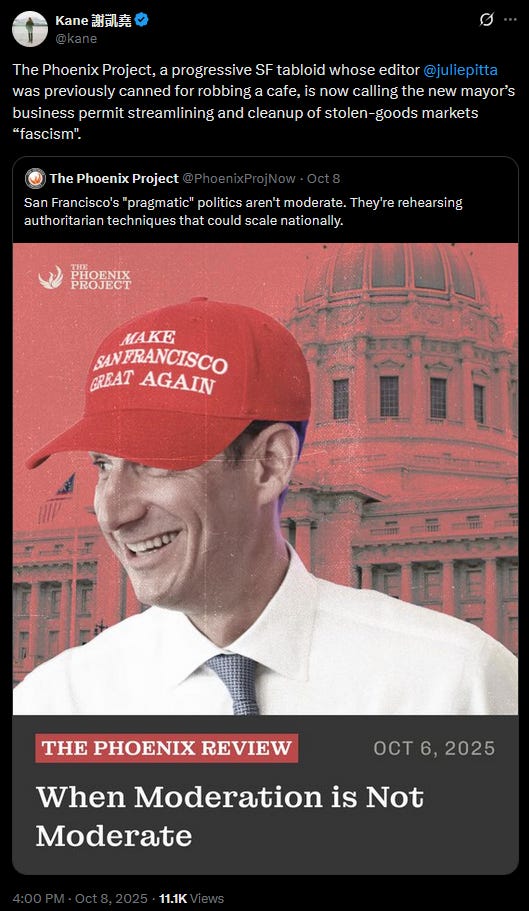The following three things can’t all be true simultaneously:
Many Americans are fascists
Fascists are an acceptable target for political violence
Political violence in America is unacceptable (at the current time)
I thought about this while following the Twitter spat between Democratic hopeful Gavin Newsom and Trump advisor Stephen Miller. Newsom called Miller fascist; Miller accused this of being a call to violence which placed “a target” on him.
Miller is hardly sympathetic here - he’s called people fascist himself in the past, and later suggested Newsom should be arrested for his speech (if only there were a word to describe the sort of person who supports that kind of thing…)
Still, I found myself able to see things from both perspectives.
From Newsom’s perspective: Miller subscribes to some type of far-right nationalism. And fascism is a type of far-right nationalism. Whether or not these are the exact same type of far-right nationalism is a taxonomic argument, much like whether some particular long slimy toothy fish should be classified as an eel. Not every long slimy toothy fish is necessarily an eel, but it seems unwise to pre-emptively rule out the possibility.
From Miller’s perspective: people absolutely use “fascist” as a synonym for “person who it is acceptable to hurt because of their politics”. The signature of a mod on a bulletin board I used to frequent - back in the days of bulletin boards, mods, and signatures - was “If I can shoot rabbits, then I can shoot fascists” - an apocryphal Spanish Civil War quote popularized by a hit rock song. A popular left-wing t-shirt, cap, and protest sign is “Make Fascists Afraid Again”.
When Woodie Guthrie famously wrote on his guitar that “This machine kills fascists” - a sentiment imitated and snowcloned by later generations of musicians and commentators - nobody worried this was a bad thing. Nobody demanded that somebody stop the machine before it killed again.
There’s no number of examples I could give which would absolutely prove I’m not cherry-picking. But I think it’s suggestive that even people who argue against casually killing fascists have to disclaim that they’re certainly not opposing all violence against fascists - just against jumping straight to murder before other forms of violence have been tried. Besides that, I can only appeal to a hope that you’ve experienced the same cultural currents that I have, and that this seems obviously true to you.
I’m not trying to normalize fascism, or claim that it isn’t extremely evil (I think it is, see here for more). I’m only saying, again, as a matter of basic logic, that the following things can’t all be true:
Many Americans are fascists
Fascists are an acceptable target for political violence
Political violence in America is unacceptable (at the current time)
And I don’t want to abandon 1, because it seems like a factual claim that might be true - even if you don’t think it’s true now, it obviously has the potential to be true in the future - and we shouldn’t ban people from asserting true claims.
And I don’t want to abandon 3, because political violence is extremely bad, the norm against it is the only thing restraining us from various forms of smoldering or overt civil war, and we’re still doing pretty well by the standards of most times and places.
So I think the natural conclusion is to abandon 2: fascists, although evil, aren’t automatically a legitimate target for political violence.
The strongest objection is a slippery slope argument: political violence will always be inconvenient; it will always be tempting to put it off until some further red line is crossed. But if we always give into that impulse, nobody will ever resist dictatorship or start a revolution against an unjust government. Isn’t the tree of liberty naturally “fertilized with the blood of tyrants”?
There’s no simple answer to this concern. Nicholas Decker, who considers this question more thoughtfully than most, concludes that:
Your threshold may differ from mine, but you must have one. If the present administration should cancel elections; if it should engage in fraud in the electoral process; if it should suppress the speech of its opponents, and jail its political adversaries; if it ignores the will of Congress; if it should directly spurn the orders of the court; all these are reasons for revolution. It may be best to stave off, and wait for elections to throw out this scourge; but if it should threaten the ability to remove it, we shall have no choice.
But all of these are their own sorts of slippery slopes. Suppress the speech of their opponents? Should the Republicans have started a civil war when Democrats got social media to do woke content moderation? Ignore the will of Congress? Should Democrats have started a civil war when Trump refused to fund PEPFAR even after Congress allocated the money? Prosecute political opponents? Should the Republicans have started a civil war when New York prosecuted Trump for Stormy Daniels? Should the Democrats start one now that Trump is prosecuting James Comey for perjury? No particular form of any of these things ever feels like the cosmically significant version of these things where assassinations and armed uprisings become acceptable. But would-be dictators are masters of boundary-pushing and frog-boiling; there’s almost never one moment when they say outright “Today I will be cancelling democracy for no reason, sorry”.
I used to think that my bright line was contempt of the Supreme Court - when a leader echoes Andrew Jackson’s boast that “[the Court] has made its decision, now let them enforce it”. But the Trump administration briefly seemed to consider defying a Supreme Court order in the Kilmar Abrego Garcia case. In the end, they didn’t actually defy the order. And they were being subtle: less Jacksonian swagger, more special pleading about reasons why they thought the ruling didn’t mean what we thought it meant. But if they had actually defied the order - while still doing their best to maintain plausible deniability - would I have resorted to violence, or even felt in an abstract way that “it was time” for violence? I can’t imagine this would have felt convincing at the time.
Is violence justified when we get to FDR-level court packing threats? When we get to Orban? To Chavez? To Xi? To Putin? To Hitler? To Pol Pot? I think I land somewhere between Orban and Hitler, but I can’t say for sure, nor can I operationalize the distinction. And the last person to think about these questions in too much detail got a (mercifully polite) visit from the Secret Service, and even if we disagree with him it’s poor practice to hold a debate where it’s impermissible to assert one side. I will be punting on the deep cosmic question here, at least publicly.
But I don’t think the answer can be “violence is permissible when you can classify someone with a loaded term so vague that people regularly use it to describe expedited restaurant permitting”.
So as a bare minimum, I think people should reject premise (2) above and stop talking about fascists as if it’s okay to kill them. I don’t think this implies support for fascism, any more than saying that you shouldn’t kill communists implies support for communism. They’re both evil ideologies which are bad and which we should work hard to keep out of America - but which don’t, in and of themselves, justify killing the host.
What about going beyond the minimum? If fascist denotatively means “far-right nationalist authoritarian corporatist”, but connotatively “person whom it is okay to kill”, and we personally try not to worsen the connotation but other people still have that association, then should we avoid using it at all? Or is it permissible to still use it for its denotative meaning?
Almost nobody uses fascism in a purely innocent denotative way; if they did, it would serve their purposes equally well to replace it with a synonym (like “far-right nationalist authoritarian corporatist”) or even a more specific subvariety (like “Francoist”). But it wouldn’t serve Gavin Newsom’s purpose to call Stephen Miller a far-right nationalist authoritarian corporatist, because Gavin Newsom specifically cares about the negative connotation of “fascist”, rather than its meaning. I trust he’s relying on some sort of weaker negative connotation, like “far-right nationalist etc who is a bad person”, rather than going all the way to “far-right nationalist etc who it’s acceptable to kill” - but it’s connotations all the way down. This isn’t necessarily bad - maybe you need some connotations to make a rhetorical case exciting enough to influence anyone besides a few political philosophers. But against this, most people who say “communist” would be happy enough to replace it with some applicable superset/subset/near-synonym, like Marxist, socialist, anticapitalist, far-leftist, Maoist, etc - and people seem to argue against communism just fine.
I think it’s probably bad practice to demand that reasonable people not use the word “fascist”. It risks giving unreasonable people a heckler’s veto over every useful term - if some moron says it’s okay to kill environmentalists, we can’t ban the term “environmentalist”, and we certainly can’t let other people back us into banning the term “environmentalist” when it’s convenient for them just because they can find one violent loon. It also risks giving too much quarter to the dangerous and wrongheaded “stochastic terrorism” framing, which places the blame for violence on anyone who criticized the victim. This not only chills useful speech - it’s important to protect the right to accuse people of being very bad, since people are often in fact very bad - but gives Power a big spiky club it can use one-sidedly to destroy anyone who criticizes it as soon as there’s a sympathetic case of violence.
Still, as an entirely supererogatory matter, I personally won’t be using this word when I can avoid it.




